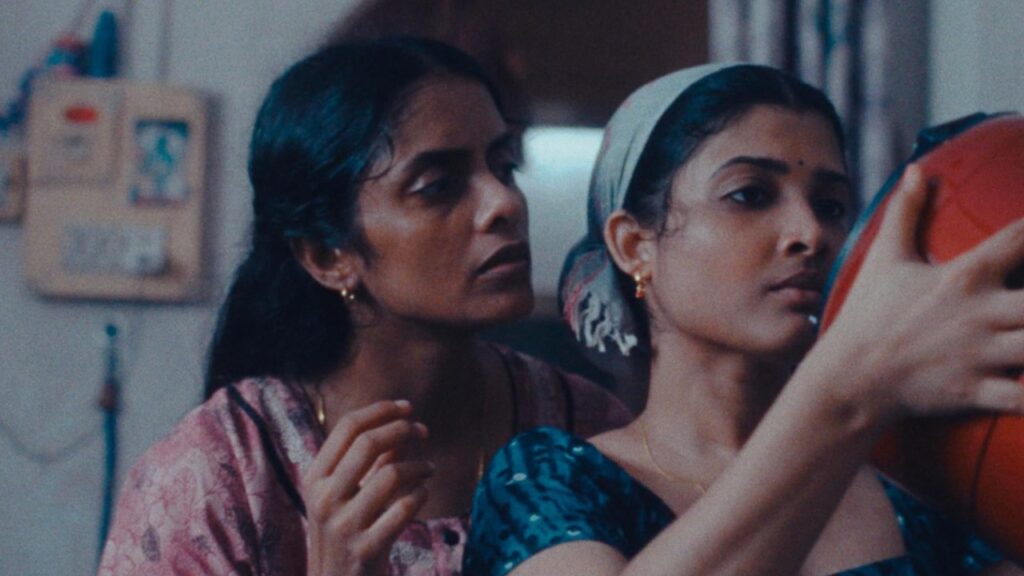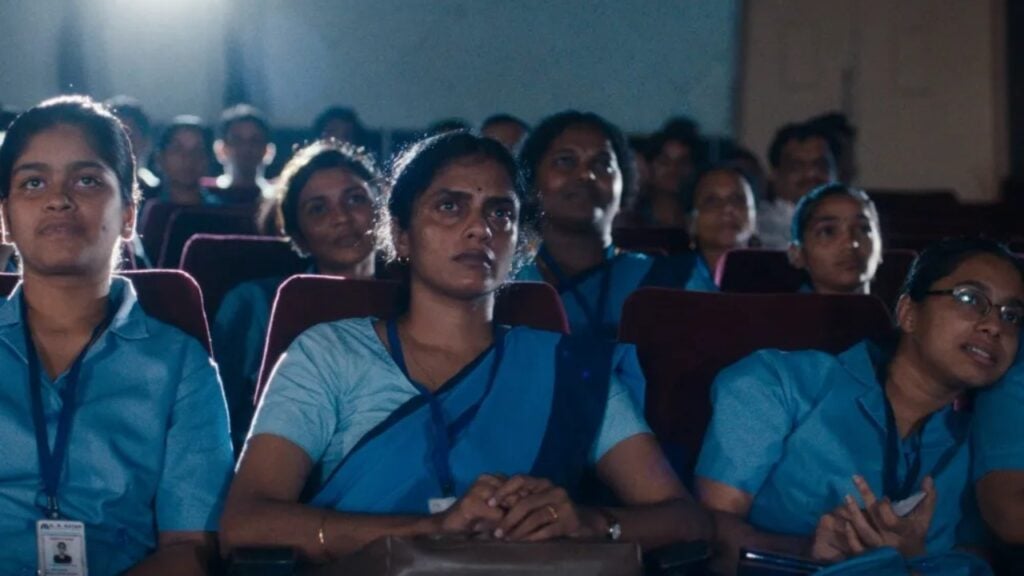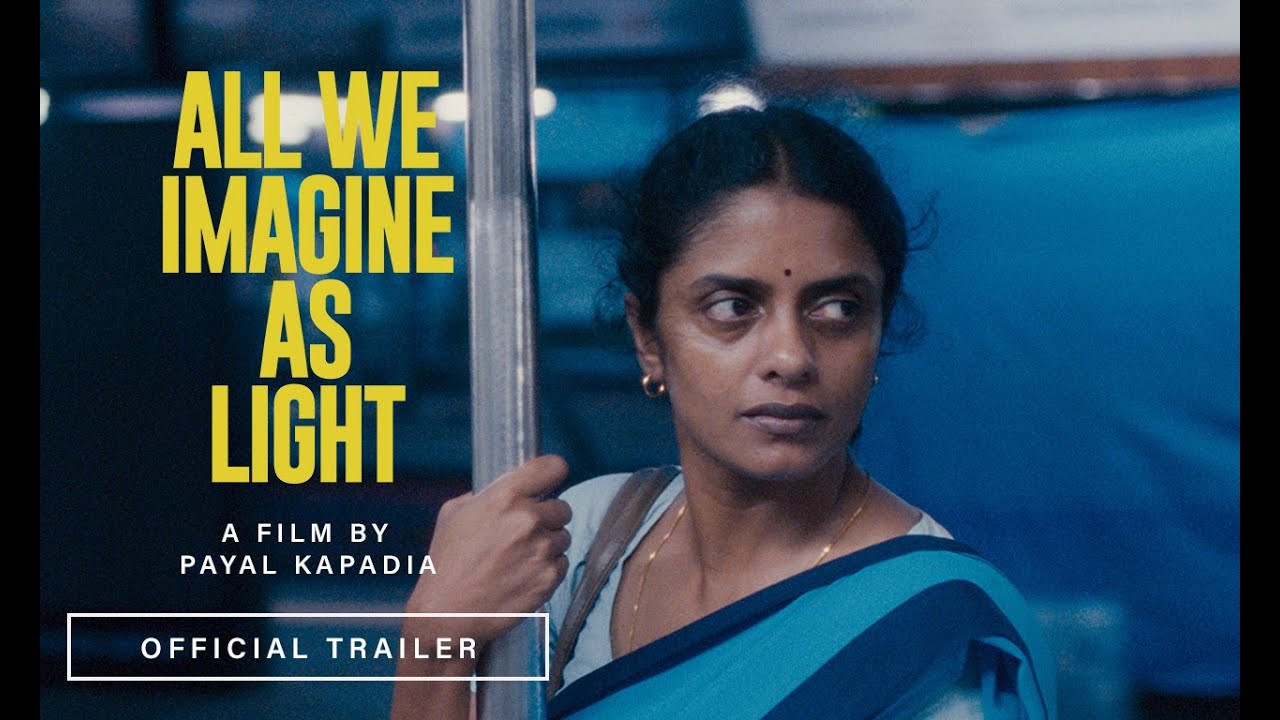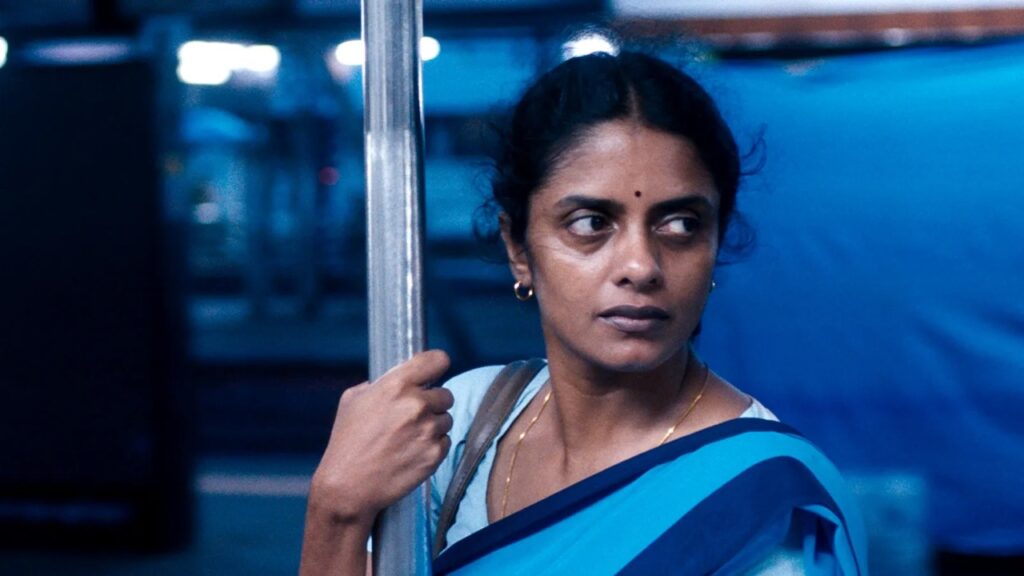Director Payal Kapadia’s sophomore film, All We Imagine as Light, was the first Indian film in more than thirty years to be screened in competition at the Cannes Film Festival this year. When watching the successor of the critically acclaimed A Night of Knowing Nothing, it slowly but steadily becomes clear why this feature was part of the line-up and why it, rightly so, won the Grand Prix. The movie might require patience, but the poetic, meditative approach certainly pays off!
Like any big, vibrant city with millions of people, Mumbai is one where loneliness and the need for love are present at its core. Just ask the housemates and fellow nurses, Prabha (Kani Kusruti) and Anu (Divya Prabha). Prabha, the more grown-up and steadfast one of the two, is married to a husband who lives in Germany. Despite their almost non-existent relationship, as sadly, the calls between them have stopped, she still holds onto her man. Even so much so that she refuses the affection of a doctor (Azees Nedumangad) who has much more passion, love and respect to give than her husband ever did.
While Prabha is broken in some ways, she’s not entirely crumbling down. Portraying a woman who’s in pain but still headstrong, determined, and caring isn’t easy. The emotions must be equally subtle and present. Kusruti (Girls Will Be Girls, Nishiddho) masterfully combines the many feelings of Prabha into vulnerable, touching acting. She delivers a fragile performance that slowly reveals the underlying cracks in her character’s tough façade and Prabha’s emotional vulnerability.

Living with Prabha is Anu, a younger counterpart, who lives a much more carefree life and follows her heart wherever it takes her. Just like her housemate, she feels the need for love, and it seems that she found that in the arms of a Muslim man, Shiaz (Hridhu Haroon). However, the young couple must keep their relationship a secret because of the possible religious issues that could come with a cross-faith relationship. Will they ever be able to declare their love in public without prejudice or problems? While Prabha has less to work with than her on-screen housemate, her acting is still very affecting and important despite being less showy or present. When Anu finally awakes on both spiritual and sexual levels thanks to her newfound boyfriend, the Declaration actress gives us some of this feature’s most delicate, beautiful, intimate moments.
Both young women are our main windows into Kapadia’s world. Their search for love, connection, autonomy, and respect already results in a complex, layered, and subtle character study. However, later in the feature, we also start to follow Parvaty (Chhaya Kadam), the older and widowed co-worker of both Prabha and Anu. It’s then that the female perspective on society in this feature becomes even more powerful.
Because of injustice against her, she decides to leave Mumbai and quit her job to return to her seaside village, Konkan, Maharashtra. Both Prabha and Anu join Parvaty as the journey to tranquillity is one they’ve never undertaken. When Kapadia takes our three leading ladies away from the city, the movie loses a bit of momentum. The change in story, overall feeling, and setting must represent Parvaty’s changing environment and mindset, but All We Imagine as Light works best in vibrant Mumbai. While Parvaty only becomes the proper focus of the feature during the final act, Kadam (Andhadhun, Laapataa Ladies) delivers a sensational performance straight from the beginning. Her acting ensures that you feel that, despite Parvaty’s life not being the easiest, she has an immense amount of wisdom, care for her younger colleagues, and determination for a better existence.

While the presence of the female gaze and the criticism of the patriarchal society is clear, the mysteries in the young women’s lives come to the forefront more subtly. This results in the movie becoming an intriguing slow burner. Because of the simplistic and genuine storytelling, you’ll be able to immerse yourself in the lives of the three women. The true-to-life setting, the genuinely honest and touching acting and the wonderful soundscape – there’s no shortage of car horns in the background – make this movie feel fully fleshed out and highly authentic.
To ensure you can absorb every fibre of Mumbai and each character trait, Kapadia lets the events unfold calmly and unhurriedly. Sometimes, that means Ranabir Das’ (A Night of Knowing Nothing) camera focuses for a long time on a character who doesn’t speak or an object that doesn’t move. While those scenes feel too long, they uphold the impact and importance of the film.
Despite its flaws, All We Imagine as Light is still a tender, slow, and heartwarming film about the need for (romantic) connection, friendship, and finding one’s own way in life. It might be nuanced in its pacing, storytelling, and visuals, but it’s very strong and powerful in its performances.
All We Imagine as Light is out now in US cinemas courtesy of Sideshow/Janus Films

Despite its flaws, All We Imagine as Light is still a tender, slow, and heartwarming film about the need for (romantic) connection, friendship, and finding one's own way in life. It might be nuanced in its pacing, storytelling, and visuals, but it's very strong and powerful in its performances.
-
GVN Rating 7.5
-
User Ratings (0 Votes)
0







